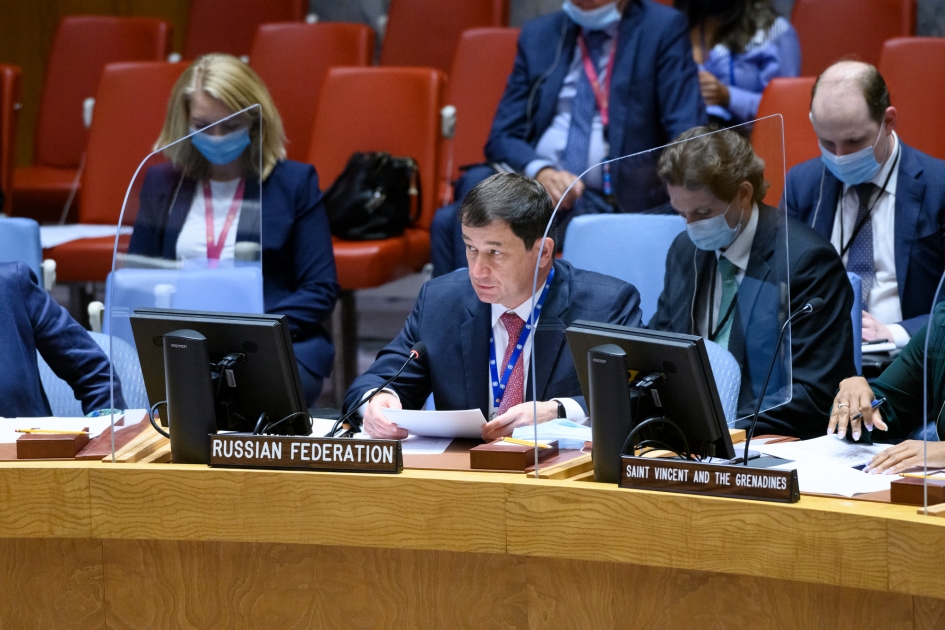Statement by First Deputy Permanent Representative Dmitry Polyanskiy at UNSC briefing on the situation in Libya
Mme.President,
We thank Special Envoy of the Secretary-General Mr. Ján Kubiš for reporting on the situation in Libya. We thank Chair of 1970 Sanctions Committee Ambassador Tirumurti for providing a review of the work of this subsidiary body of the Security Council. We also listened carefully to Ms. Asma Khalifa.
Mme.President,
It is with great caution that we monitor the prospects of military and political developments in Libya. On the one hand, the situation in former Jamahiriya has improved remarkably as compared to the previous period. Thanks to the signing of the ceasefire agreement in October last year, the overall truce is holding, which allows for some progress with political settlement. Conditions were created for forming unified transitional authorities in February-March this year. Libyans gradually started to overcome mutual mistrust caused by the protracted conflict, and make joint steps to bring together state structures and institutes.
At the same time, we are very worried about the fact that implementation of the roadmap for settlement that was endorsed by Libyan Political Dialogue Forum (LPDF) started to falter.
At the meetings of LPDF in July and August, its members failed to reach consensus to adopt legislative basis for convening the general elections that are scheduled for December this year. At this moment, discussion within the LPDF framework is continuing. Hopefully, Libyans will be able to overcome all contradictions they have had and find some common ground, given the fact that the future of the Libyan people is at stake. Unfortunately, we have come to hear voices calling to reschedule the elections or divide them and have presidential and parliamentary elections running separately in two stages. Such prospect may reduce all progress of the recent months down to a zero.
We are convinced that success of pending elections and the political process at large will be directly dependent i.a. on the level of inclusiveness – engagement of all leading political forces of Libya, representatives of all regions of the country, and former authorities.
Mme.President,
Cessation of hostilities more than a year ago marked a big achievement at the military track. However, further movement towards full and final settlement of Libya’s armed conflict requires robust efforts. “5+5” Joint Military Commission plays an important role in uniting the country’s armed forces and stabilizing the security situation, however many of the decisions made by this body exist only on paper. Full launch of West-to-East coastal highway still waits to be endorsed. Thereby sides relay to one another the responsibility for failing to meet the relevant obligations.
Such volatile situation has to do with the lack of solution to the problem of foreign military presence in Libya. We stand for step-by-step synchronized evacuation of all non-Libyan armed groups and formations. Thereby it is essential to preserve the current balance of power on the ground, thanks to which the country could escape the threat of another round of confrontation. We must not forget about the interests and the experience of Libya’s neighbors when it comes to repatriating foreign combatants.
We are convinced that there is no alternative to a comprehensive settlement of the Libyan crisis under the UN auspices. We welcome the initiatives of Special Envoy J.Kubiš and Libya’s Minister for Foreign Affairs and International Cooperation N.Mangoush, aimed at stabilizing the security situation. We are ready to interact constructively with the international partners. We also commend the humanitarian initiative for comprehensive national reconciliation that was articulated by Chair of the Presidential Council M.Manfi. Under this initiative, concrete steps already have been made to restore trust among various Libyan forces. Hopefully, the initiative will make a meaningful contribution to a country-wide reconciliation.
In conclusion, I must flag that we remain concerned over the problem of illegal migration and spread of arms in Libya that affects the security of this particular country, and also of the entire Sahara-Sahel region. We count on having more efficient inspections off the Libyan coast that should run in full compliance with the international law At the same time, we would like to underscore that international restrictions must help Libya’s political process and bring this country back to stability rather than impede this process.
At this moment, we are engaged in elaborating a resolution that should renew the mandate of the United Nations Support Mission in Libya (UNSMIL). We will be very careful when reconsidering the tasks and structure of UNSMIL. The most important thing we need to do now is to preserve the progress that we already have and the Mission’s capacity, especially at this crucial pre-elections stage. We assume that the United Nations needs to focus at this track rather than diffuse all it efforts.
Thank you.
